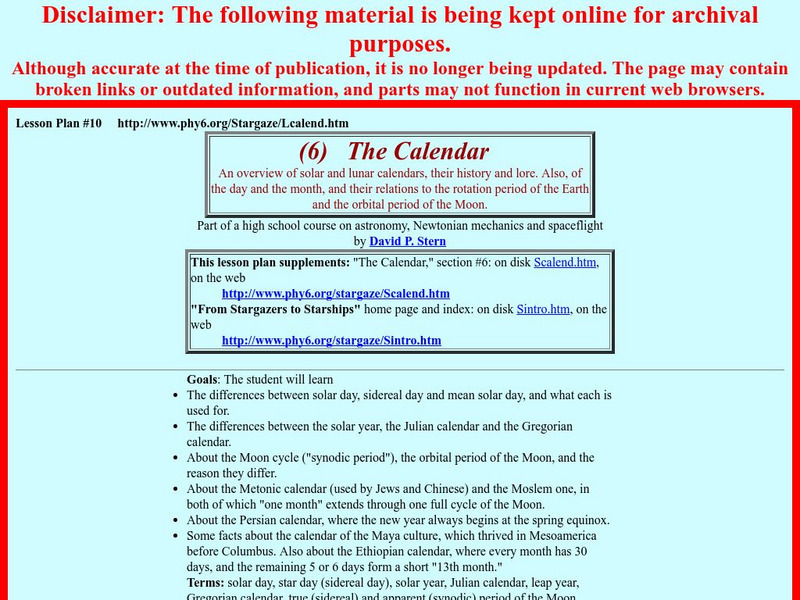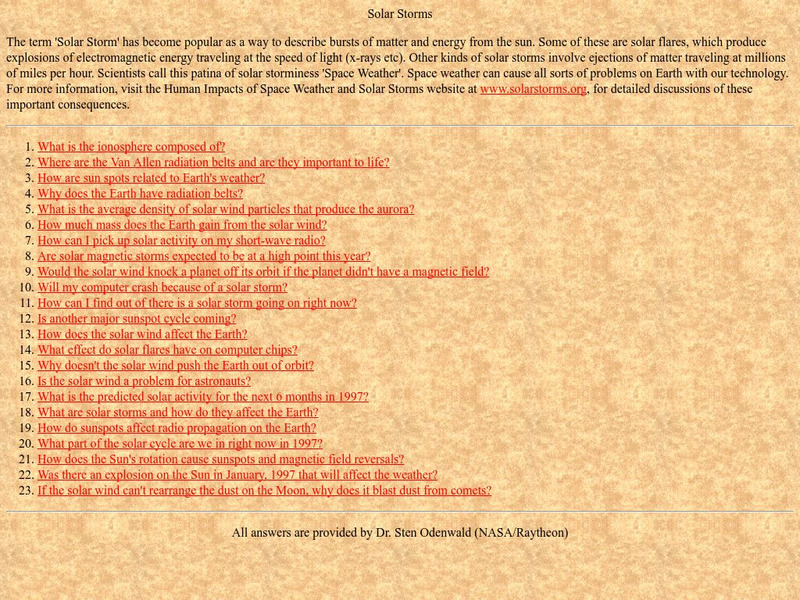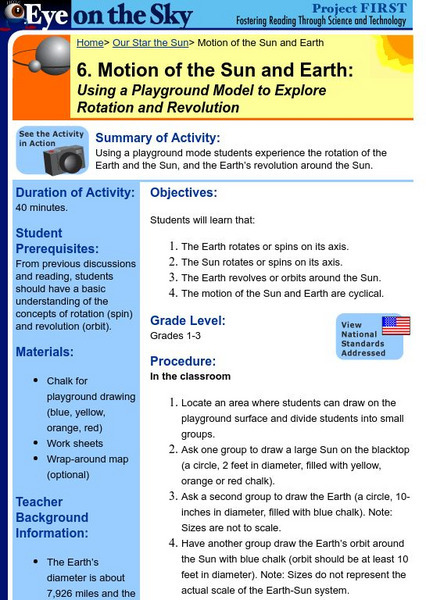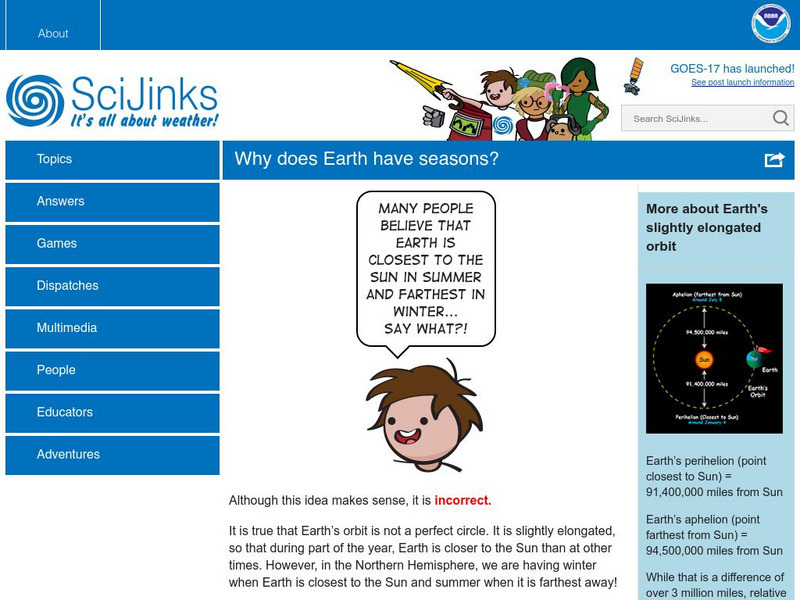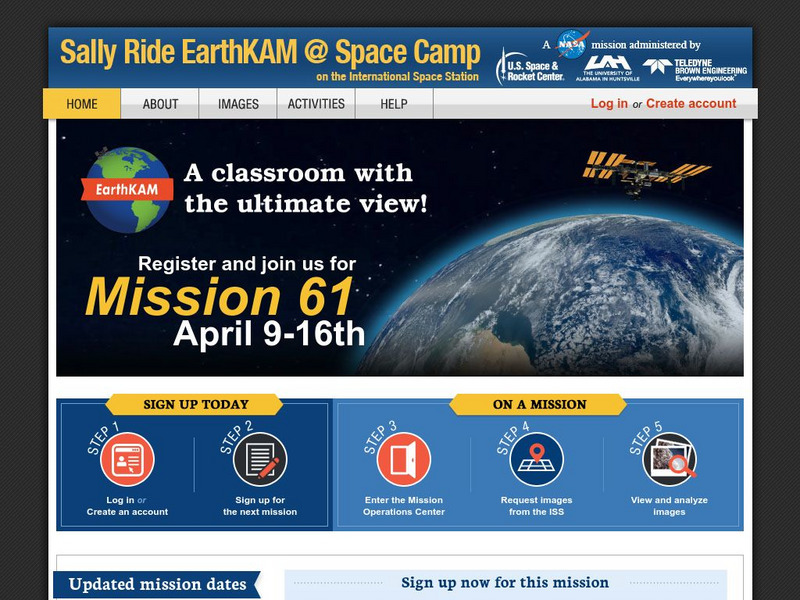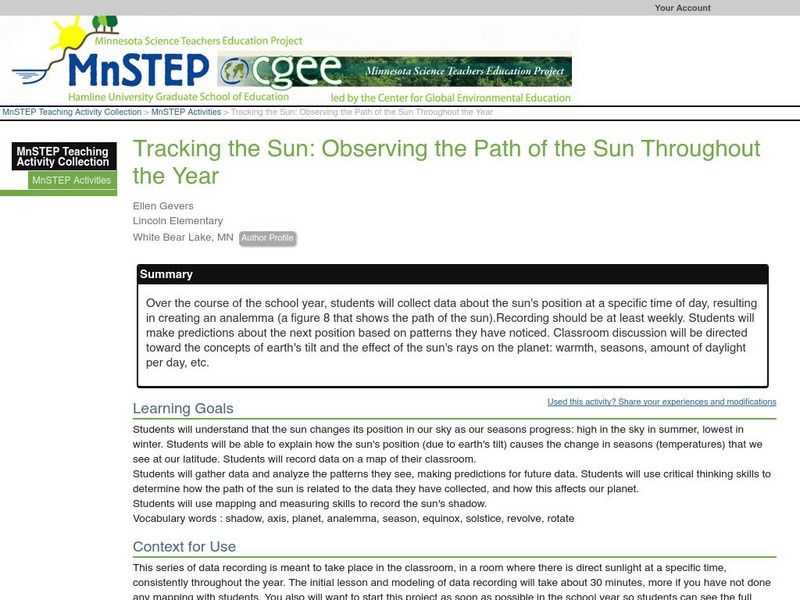Scholastic
Scholastic: Study Jams! Science: Weather & Climate: Seasons
A slideshow and a short multiple-choice quiz on the topic of seasons and how they are caused by the Earth's rotation and orbit.
Utah Education Network
Uen: A Moon With a View
Understand the rotation of the earth and the appearance of movement of other bodies in the sky.
PBS
Pbs Learning Media: What Causes the Gulf Stream?
This video segment adapted from NOVA uses satellite imagery to illustrate the Gulf Stream's path and animations to explain how atmospheric phenomena cause it to move. [1:51]
Sophia Learning
Sophia: Earth and Sun
A slideshow exploring Earth's rotation and revolution around the sun. Learn that because of Earth's axis tilt we experience the seasons!
NASA
Nasa: Earth: Overview: Our Home Planet
Provides a comprehensive look at the planet Earth including photos, how Earth got its name, and facts and figures about its size, seasons, moon, atmosphere, rotation, and lithosphere.
Annenberg Foundation
Annenberg Learner: Moon Journal Activity
Students use the process of journaling to make discoveries about the moon. This activity involves having students write observations about the moon in a journal. Using their observations they go to an online resource and choose...
PBS
Pbs Learning Media: Giving Rise to the Jet Stream
This interactive activity from NOVA Online uses animation and graphics to offer a detailed explanation of the jet stream. A thorough account is given of the role played by the Sun's heat and Earth's shape and rotation, among other factors.
Other
Astro Methods: Earth's Nutation Visualized
Nutation is a small cyclical motion superimposed upon the steady 26,000-year precession of the Earth's axis of rotation. It is mainly caused by the gravitational effect of the 18.6-year rotation period of the Moon's orbit. The main...
Illustrative Mathematics
Illustrative Mathematics: G Mg Tilt of Earth's Axis and the Four Seasons
This task gives students a chance to explore the effects of the Earth's tilt and rotation using a simple geometric model of Earth-Sun interaction that shows why the seasons occur. Aligns with G-MG.A.1.
CK-12 Foundation
Ck 12: Plix: Seasons: Earth's Orbit
[Free Registration/Login Required] An interactive animation demonstrating the Earth's tilted axis and how that causes the seasons. Also included on the site is a short quiz on the topic.
National Weather Service
National Weather Service: Jet Stream: The Jet Stream
The concept of jet streams is explained on this site. Read about why jet stream winds blow from west to east, what the polar jet and subtropical jet are, the role that the rotation of the Earth plays, etc.
NASA
Nasa: From Stargazers to Starships: The Calendar
A lesson plan that gives an overview of solar and lunar calendars, their history and lore. Also, of the day and the month, and their relations to the rotational period of the Earth and the orbital period of the Moon.For versions in...
Libre Text
Libre Text: The Coriolis Force
The Coriolis force is a central element of the dynamics of ocean and atmosphere flows.
E-learning for Kids
E Learning for Kids: Science: Rio De Janeiro: Day and Night: The Sun
Gabriella lives in Rio de Janeiro, Brazil. Help her learn more about the sun and identify the properties of the sun.
NASA
Nasa: Image Science Center: Ask the Space Scientist Earth
Site from NASA contains a collection of 91 questions pertaining to the Earth's atmosphere, magnetic field, ionosphere, rotation and origin of life.
Geography 4 kids
Geography4 kids.com: Earth Around the Sun
Find out what all results from Earth revolving around the sun every 365 days as well as the rotation of the Earth every 24 hours.
Other
Center for Science Education: Eye on the Sky: Motion of the Sun and Earth
Students model the interaction of the earth and the sun. The activity is designed for the playground. You will need chalk, but all the other worksheets are provided.
Other
Center for Science Education: Eye on the Sky: What Makes Day and Night?
This activity will allow you to model day and night cycles. A rotating student holding a map (provided) models the earth. A lamp is used to model the sun. Numerous worksheets (pdf) and additional website resources are also provided.
NASA
National Aeronautics and Space Administration: Scijinks: Seasons
An explanation about the rotation of the Earth and why the Earth has seasons.
University of Texas at Austin
The University of Texas Mc Donald Observatory: Earth's Moon
Discover interesting facts about Earth's partner, the moon, which is more like a double planet than a planet and a moon.
ClassFlow
Class Flow: Earth, Sun and Moon
[Free Registration/Login Required] In this unit children learn about the shapes and relative sizes of the Earth, Sun and Moon. Using models they learn how the three bodies move relative to each other and how these movements relate to...
Other
Nasa: Iss Earth Kam
Students get a whole new perspective of the world through images obtained from the International Space Station. Students can even request images to be taken through ISS EarthKAM. Activities and educator guides are provided.
Science Education Resource Center at Carleton College
Serc: Tracking the Sun: Observing the Path of the Sun Throughout the Year
Over the course of the school year, students collect weekly data about the sun's position at a specific time of day, resulting in creating a figure "8" that shows the path of the sun called an analemma.
Other
University of Windsor: Climates on a Rotating Earth
This site offers the text of a college lecture on the atmosphere, with information on the effect prevailing westerlies have on North America.






